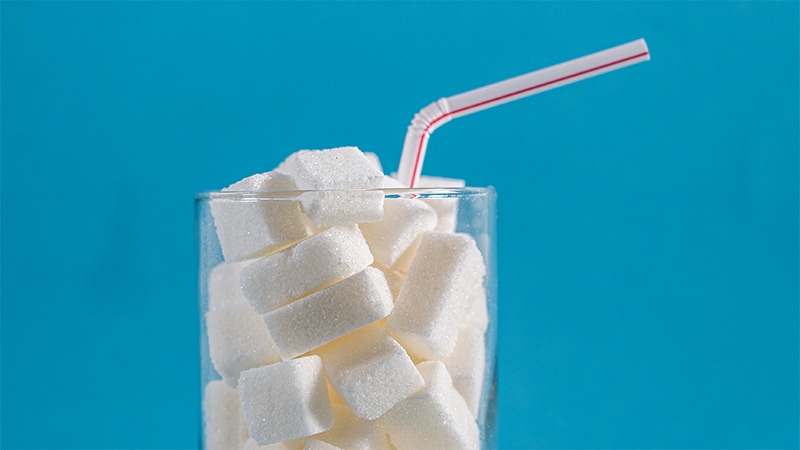[ad_1]
Consumption of sugary drinks is linked to 9.8% of new cases of type 2 diabetes (T2D) annually, contributing to approximately 2.2 million cases worldwide. These beverages are also linked to 1.2 million new cardiovascular disease (CVD) cases each year, or 3.1% of the global total, according to a study published in Nature Medicine. The researchers analyzed data from the Global Dietary Database of 184 countries between 1990 and 2020. This study reveals that developing nations are particularly vulnerable to the health risks posed by these products.
Latin America and the Caribbean are the most affected, with 24% of new global cases of T2D and over 11% of cases of CVD linked to the consumption of sugar-added beverages. Colombia and Mexico were the leading contributors, with 48% and 30% of new cases of diabetes linked to these beverages, respectively.
Sub-Saharan Africa follows, with 21.5% of new cases of T2D and 10.5% of CVD cases linked to sugar-sweetened beverages.
Researchers assessed the effects of beverages with at least 50 kcal/240 mL serving, including commercial or homemade sugary drinks, soft drinks, energy drinks, industrialized fruit juices, punches, lemonades, and aguas frescas (a Latin American beverage made from fruit, cereals, flowers, or seeds blended with water and sugar). However, 100% natural fruit and vegetable juices and calorie-free beverages containing artificial sweeteners were excluded from the study.
Unequal Impact
The authors drew attention to the trends in the consumption of sugar-sweetened beverages in developing countries. According to them, rising incomes in developing nations have made sugary drinks more accessible, fueling increased consumption. While patterns vary by region, young adults and men face greater health risks than women and older adults. As consumption declines in high-income countries, beverage companies have shifted their marketing efforts toward emerging markets.
The authors urge strengthening regulatory strategies and introducing measures to safeguard the health of these populations, such as establishing taxes on these products.
In an interview with Medscape Medical News, Laura Lara-Castor, PhD, lead author of the study and a researcher at the University of Washington, Seattle, said that the “Policies that have proven effective and should continue to be implemented and updated include soft drink taxes, marketing regulations, purchase restrictions, front-of-pack warning labels, and education campaigns.”
“A multilateral effort by national and international agencies is needed to help countries with less administrative capacity to implement and evaluate these policies, to combat inequalities in the impact of these diseases,” she emphasized, reinforcing the importance of measures to provide access to drinking water.
Lara-Castor noted that while some sugary drinks have been reformulated because of health concerns, the industry has responded to aggressive marketing. In South Africa, for instance, despite a sugar tax, beverage companies have increased their advertising to maintain sales, particularly targeting affluent men under the age of 45, the highest consumers in the region.
Once consumed, sugary drinks have multiple harmful health effects. Because they can be consumed quickly, they are also digested in a short time, resulting in less satiety, increased calorie intake, and weight gain.
“High doses of rapidly digested glucose also activate insulin and other regulatory pathways, which can result in visceral fat production, hepatic and skeletal muscle insulin resistance, and weight gain. High doses of rapidly digested fructose directly activate hepatic fat synthesis, leading to ectopic fat deposition and metabolic dysfunction in liver and muscle,” the authors wrote.
Predictable Concern
Fernando Valente, MD, endocrinologist and director of the Brazilian Diabetes Society, called the study’s findings significant but expected.
According to him, evidence of the extent of the damage caused to health by the consumption of drinks with added sugar reinforces the importance of the work of doctors, in addition to health professionals in general, in guiding their patients.
“Knowing this information, it is necessary to alert patients, disseminate this information, and provide alternatives to these drinks. Many times, patients know that soda, for example, is not healthy, but they do not know the extent of its impact on their health. Some people even associate T2D with the consumption of sugar-sweetened beverages, but I think most people do not even imagine CVD,” he said.
Valente emphasized the importance of healthcare professionals guiding patients toward healthier alternatives to sugary beverages. “Ideally, people should drink water, whether still or sparkling. Adding a touch of lemon can enhance flavor and improve adherence in the long term,” Valente advised. He also advocated for public health measures, such as educational campaigns, warning labels, and taxation on sugary drinks in Brazil.
Fernando highlighted that, in Brazil’s context, these findings support the need for a selective tax on sugary beverages. The so-called ‘sin tax,’ a common term for levies on products and activities deemed harmful to health or the environment, is highly relevant in Brazil.
This story was translated and adapted from Medscape’s Portuguese edition using several editorial tools, including AI, as part of the process. Human editors reviewed this content before publication.
[ad_2]
Source link : https://www.medscape.com/viewarticle/sugary-drinks-fuel-millions-diabetes-and-cvd-cases-2025a10002wr?src=rss
Author :
Publish date : 2025-02-06 05:53:08
Copyright for syndicated content belongs to the linked Source.
